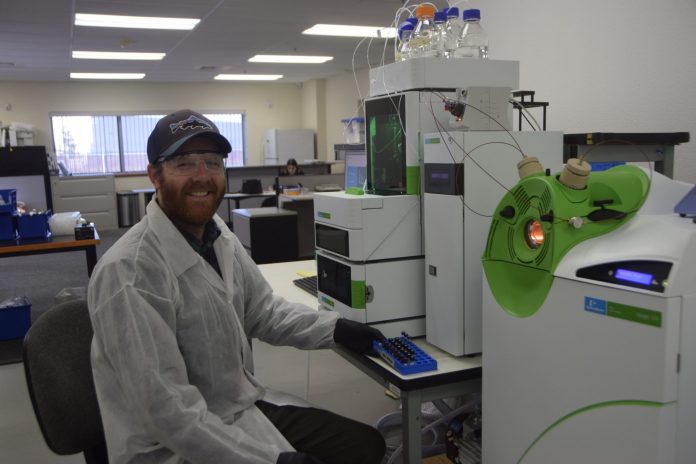
This isn’t your grandad’s cannabis business—unless your grandfather happens to be Captain Kirk.
High Sierra Analytics in Hollister expects to open its cannabis testing laboratory within a month, in an industry that has lots of demand, but little supply. As testing requirements become tighter over the next couple of months, a vital component of the booming cannabis industry will go through Hollister.
“Everyone kept asking when we’re going to open,” High Sierra Analytics CEO and founder Thomas Gromis said. “I kept telling them, ‘When we get it right.'”
Gromis, 34, a Fresno native, worked for the California Department of Fish and Wildlife as a freshwater ecologist before embarking on a career in the cannabis industry. After Gromis could not find municipalities near Fresno that offered cannabis permits, he looked to the nearest city that would: Hollister.
“I didn’t want to get into growing; that seemed like a race to the bottom. I don’t want to chase margins and cut corners just to get by,” Gromis said. “I looked at the regulations and the people who were getting into testing, and nobody wanted to touch the lab stuff because the regulations were pretty daunting.”
After Californians voted in the 2016 general election to legalize cannabis consumption, new cannabis testing rules were mandated to go along with legalization. Cannabis products must be tested for pesticides as well as potency before they can hit the market. Since High Sierra Analytics will be one of about 40 testing laboratories in the state, demand will be high.
There were many hurdles to overcome since the company signed the lease for the Airway Drive space last year. Gromis needed to provide window shading, magnetically sealed doors and biometric key cards to get a permit. The building at 1851 Airway Drive already had cameras, a gate and security personnel, which helped to simplify the permitting process. In addition to these security methods, the Hollister Police Department may access High Sierra Analytics at any time, said Gromis.
High Sierra’s fee structure is based on entering contracts with growers rather than on a pay-by-test model. Contracts will be based on how many tests the customer wants per month, with regularly scheduled pickup times that will hopefully reduce waiting time for tests to return. Time is money, and since cannabis can’t hit the market until testing is complete, a quick turnaround is essential to retailers.
“The more you do, the cheaper it’s going to be, but right now we’re looking at around $700 for a single test,” said Gromis, adding that they would offer cheaper rates for bulk testing.
High Sierra will focus on a 50-mile radius after it opens, moving out as far as 150 miles as operations ramp up. Most of their business will stay local, in Hollister, Salinas and unincorporated San Benito County.
“We’d like to offer some lower rates here for everyone who’s getting in early and work as an incubator to help this community grow,” Gromis said.
Demand for testing will only increase in 2019 with additional state-mandated tests for heavy metals, micro-toxins and moisture. With further testing comes more expenses, and each test could cost about $1,000.
Gromis hopes to grow the testing capacity of the company while simultaneously building working relationships with clients, helping to improve efficiency while reducing costs.
Along with obtaining permits, Gromis faced the daunting task of buying equipment (one piece in particular cost as much as a starter home, according to Gromis,) along with hiring qualified chemists. Since the testing industry requires meticulous record keeping, Gromis looks for people who have an eye for details.
“We’re really a fan of OCD people here,” Gromis said. “Our records are extremely important.”
Sequoia Analytical Labs in Sacramento was a perfect example of what happens when records are improperly kept. In early December Sequoia Analytical was shut down after a lab director falsified test results. Because of the falsification, over 700 test results are now in doubt, opening the possibility of a recall of cannabis products already tested.
The data, whether the product passes or fails, is sent to the Bureau of Cannabis Control, which may audit a lab at any time. With more testing regulations coming, audits may increase, and with Sequoia Analytical Labs serving as an example, the need to keep precise records is necessary to stay in business.
With strict testing laws, cannabis cultivators will be held to higher standards, meaning that if the cannabis fails to pass acceptable levels of pesticides, microbes, heavy metals and other impurities, the product fails, disqualifying it for sale, and what cannot be sold is sent to be destroyed.
“The stakes are higher now, and the testing is far more rigorous,” Gromis said. “We’re working for the state, not just our customers.”
Since getting into the cannabis industry, Gromis has become a believer in what cannabis can do medically.
“We find out new information every day,” said Gromis, who uses Cannabinoids to help him sleep. “This plant has a lot that we haven’t discovered yet. It will change a lot of people’s lives, and it already has for many people with epilepsy. Unlocking what all these cannabinoids can do is going to be extremely interesting in the next five to 10 years.”
High Sierra Analytics employs two chemists, a lab director, two laboratory technicians and a driver.









